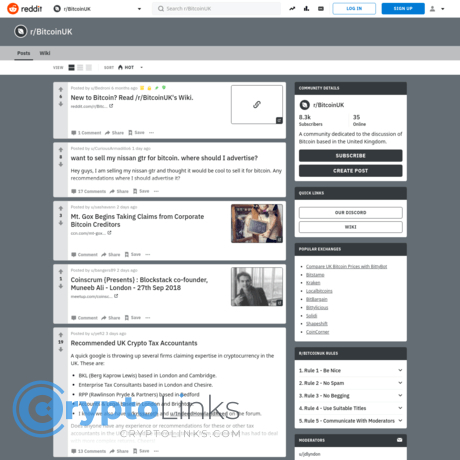r/BitcoinUK Review
r/BitcoinUK
www.reddit.com
r/BitcoinUK Review Guide (2025): Is it Worth Your Time? Everything You Need to Know + FAQ
Looking for a UK-flavoured Bitcoin community that actually helps you buy, sell, and stay safe? Wondering where Brits talk fees, HMRC, and GBP cash-outs without the noise or shilling?
If you’ve ever tried to figure out whether your bank will block a Faster Payments withdrawal, or how to treat a mining reward for HMRC without wading through memes and outdated threads, you’ve felt the pain. Let’s fix that.
Describe problems or pain
Most crypto subs are global and loud. They’re great for headlines, not so great for UK reality. Here’s what usually goes wrong:
- Global advice that breaks in the UK — “Just use XYZ exchange” until you learn it doesn’t support GBP, or your bank throws a fraud check on every deposit.
- Outdated posts — FCA rules changed in 2023–2024, promotions got stricter, and banks updated policies. Old “how-to”s can cost you fees, time, or worse.
- Referral spam and shills — New accounts pushing a “no-fee” service that somehow nobody reputable mentions. You know the type.
- Tax confusion — HMRC isn’t a vibe; you need correct terms like cost basis, CGT, and what counts as income vs disposal. Random threads rarely give the full picture.
- On/off-ramp friction — UK banks vary wildly. Some play nice with exchanges, others block or limit card purchases and scrutinise withdrawals.
- Security traps — Fake support DMs, seed “recovery” offers, and Telegram helpers that are anything but helpful.
These aren’t hypothetical. UK regulators have tightened crypto promotions and risk warnings since late 2023, and banking fraud checks are more aggressive across the board. The FCA has repeatedly flagged illegal promotions and misleading claims, and Action Fraud reports a steady stream of crypto-related scams targeting UK users. In short: the UK context matters.
Ever tried to cash out to GBP on a Friday afternoon and your bank throws a “security review” on your transfer? Or your exchange quietly hikes GBP withdrawal fees? That’s the sort of real-world UK friction you’ll actually see discussed in r/BitcoinUK.
Promise solution
Here’s the plan: I’ll show you how r/BitcoinUK actually works in 2025, where the useful threads live, how to filter high-signal posts, and which rules keep you safe from the usual Reddit traps. You’ll also get quick, practical answers to the questions I see every week: cashing out to GBP, putting £100 into Bitcoin, common UK bank issues, and what to do when HMRC season hits.
How I test communities
I keep it simple and hands-on:
- Join, read, and sort by New and Top (Past Year) to judge freshness vs evergreen quality.
- Ask a real question, track how long it takes for a helpful reply, and note if mods keep spam in check.
- Scan for shill patterns: brand-new accounts, copy-paste talking points, too-good-to-be-true claims.
- Check if answers include specifics: bank names, dates, fees, and what actually worked.
- Look for flairs and stickies that show the mod team cares about safety, tax clarity, and UK context.
Quick verdict upfront
Short answer: r/BitcoinUK is one of the better spots for UK-specific Bitcoin talk — especially for GBP cash-ins/outs, bank experiences, and tax chat. It’s not noise-free, and you’ll see the occasional shill or low-effort take, but the rules, flairs, and active members make it useful if you know how to navigate it.
- Best for: GBP on/off-ramps, bank policy updates, HMRC basics, security tips, UK regulation news.
- Watch-outs: Outdated threads during policy changes, referral links, and “DM me on Telegram” types.
- Pro tip: Use flairs like Banking, Tax, Security, and sort by Top (Year) before making a move.
How this guide is structured
You’re getting a practical walk-through of how to use r/BitcoinUK without wasting time:
- What the sub actually is and who it’s for
- How to extract real value fast with search, flairs, and weekly threads
- UK topics you’ll actually care about: cash-outs, HMRC, FCA rules, banks, security
- Safety rules, red flags, and when to step away
- FAQ with straight answers to the questions I see every week
- My verdict and smart alternatives to round out your research
Ready to see who r/BitcoinUK really serves — and whether you’re one of them? Let’s look at what the subreddit is and who gets the most out of it next.
What is r/BitcoinUK and who is it for?
r/BitcoinUK is Reddit’s UK-first corner of the Bitcoin world. Think practical, London-to-Leeds reality: GBP on/off-ramps, Faster Payments quirks, HMRC expectations, FCA headlines, and which banks are being friendly (or finicky) this week. If you live in the UK, earn in GBP, or bank here as an expat and you want Bitcoin talk without altcoin hype or meme spam, this is the place you’ll actually use.
The tone is grounded and straight-talking. You’ll see everyday questions from beginners, experienced HODLers comparing exchange fees, and people sanity-checking bank letters or compliance holds. It’s not where you go to speculate on the “next big coin.” It’s where you go to figure out how to move Bitcoin and pounds safely and cheaply—today.
“In crypto, local rules matter more than global hype.”
Why it matters: UK rules and bank policies are their own universe. The FCA’s consumer research has shown that millions of UK adults have interacted with crypto, and most did so through centralized exchanges using familiar banking rails. That’s exactly the context r/BitcoinUK tackles, daily. If you care about the nuts and bolts—how to cash out, what records HMRC expects, which wallet to trust—this subreddit matches your real life.
Subreddit at a glance
- Community size and activity: A sizeable, active UK crowd with new posts most days and comments coming in quickly on time-sensitive topics like bank holds or exchange outages. Expect stronger activity during market swings.
- Mod presence: Visible. Referral spam gets pulled, low-effort shilling gets flagged, and off-topic altcoin promotion is usually removed. Stickied posts appear for hot-button items (regulation shifts, scam alerts).
- Flair system: You’ll regularly see flairs such as Question, Discussion, News, Tax, Security, Banking, Wallets, PSA, Beginner. Flairs make it easier to scan for what you need—especially if you’re there for bank/exchange experiences or tax talk.
- Rule strictness: Middle-of-the-road in the good way: open to beginner questions but tough on promos and misleading “advice.” Keep posts UK-specific and focused on Bitcoin to avoid removals.
- “UK-only” in practice: You don’t need a UK passport to participate. Just keep it relevant to GBP, UK banks, FCA/HMRC issues, or UK retail reality. Non-UK readers still learn a ton about security, self-custody, and red flags from an audience dealing with real, regulated on/off-ramps.
What you’ll actually find there
- Exchange and bank experiences: Reports on GBP deposits/withdrawals, Faster Payments timelines, compliance checks, and how different banks respond to crypto-related transfers.
- Fees and GBP cash-outs: Side-by-side comparisons from users: instant vs standard withdrawals, maker/taker fees, network fees at busy times, and where costs surprise new users.
- Wallet questions: “Which hardware wallet for long-term holding?”, “How do I verify firmware?”, “Is this seed phrase backup method safe?” You’ll see seasoned users share repeatable setups.
- Scam and phishing alerts: Fake support DMs, Telegram “helpers,” recovery-seed traps, impostor exchange links—often with screenshots so you know exactly what to avoid.
- HMRC and records: People swapping experience on cost basis tracking, CGT thresholds, and the kind of documentation HMRC expects if you’re queried. Treat it as peer experience, not formal advice—then check official guidance from HMRC.
- Regulation headlines: FCA updates, exchange KYC changes, advertising rules, and what those changes mean for UK users trying to keep things simple and compliant. For context, the FCA’s consumer research offers useful background on UK crypto behavior: FCA research.
- Hardware wallet setup and security habits: Seed storage best practices, passphrase tips, basic multisig conversations, and how to avoid common UK-targeted phishing lures.
- Meetups and local angles: Occasional local events, regional bank trends, or UK marketplace tips when they’re relevant to Bitcoiners.
To give you a feel, you’ll see posts like:
- “Faster Payments to a major exchange is still ‘pending’ after 3 hours—normal on a Sunday?”
- “Got an HMRC letter asking for records after a cash-out—what did you submit?”
- “Hardware wallet arrived—how do I verify I’m not being supply-chain scammed?”
- “Bank flagged my GBP withdrawal—what proof did you provide that satisfied checks?”
It’s very nuts-and-bolts, and that’s the point. These threads save you time, money, and headaches.
How it compares to r/Bitcoin or r/UKPersonalFinance
- r/BitcoinUK vs r/Bitcoin: r/Bitcoin is global—macro news, network debates, tech philosophy, and market cycles. r/BitcoinUK is local and practical: GBP payments, bank friction, HMRC realities, and UK security norms. Use r/Bitcoin for broad developments; use r/BitcoinUK to act in the UK without guesswork.
- r/BitcoinUK vs r/UKPersonalFinance: UKPF is great for budgeting and tax literacy, but it’s crypto-agnostic and stricter about speculation. r/BitcoinUK sits closer to the ground on crypto-specific steps like exchange fees, withdrawal methods, and wallet safety. Cross-check tax nuance with UKPF or official HMRC resources, then come back to r/BitcoinUK for implementation details and lived experience.
- When to cross-check: If a thread touches on technical network topics (mempool behavior, Lightning routing quirks), verify with r/Bitcoin or reputable wallet docs. If a thread edges into complex tax strategy, double-check with UKPF or HMRC’s manual. If it’s about bank policy or FCA rule changes, look for corroborating links to official announcements.
Bottom line, this subreddit is where UK Bitcoin gets practical. And if you want to get the most value without wading through noise, here’s the trick I use to surface the best posts fast—want me to show you exactly how I search, filter, and find the good stuff in a few clicks?
How to get real value from r/BitcoinUK (fast)
I treat r/BitcoinUK like a real-time UK Bitcoin control panel: I want signal, not noise. Here’s the exact playbook I use to find the right threads in minutes, ask questions that get solid answers, and keep tabs on outages, fees, and policy changes without doomscrolling.
“Trust, but verify. In Bitcoin, that’s not cynicism—it’s self-preservation.”
Smart searching and sorting
Reddit’s built-in search is okay, but pairing it with Google’s operators pulls up the best UK-focused answers fast. I use two tracks: Google for depth, Reddit for freshness.
- Google the subreddit directly (best for “how-to” and evergreen UK info):
- site:reddit.com/r/BitcoinUK "Faster Payments" Kraken OR Coinbase
- site:reddit.com/r/BitcoinUK HMRC "capital gains"
- site:reddit.com/r/BitcoinUK "cash out" -ATM -P2P
- site:reddit.com/r/BitcoinUK FCA ban OR rules OR compliance
Tip: Use quotes for exact phrases, OR to widen options, and the minus sign to exclude junk. Google’s advanced operators are your friend.
- Sort on Reddit for speed (best for “is something broken right now?”):
- Top → Past Year: pulls up evergreen UK-guides, fee breakdowns, bank experiences that stood the test of time.
- New: if you suspect an outage or weird bank behaviour (Faster Payments rejected, Coinbase/ Kraken withdrawals delayed), refresh “New” and scan timestamps.
- Cross-check status pages in parallel:
- Coinbase Status
- Kraken Status
- Monzo Status | Revolut Status | your bank’s status page
- Set up simple alerts so you don’t miss UK-critical threads:
- Use Reddit’s search in r/BitcoinUK (e.g., “HMRC” or “FCA”), then append .rss to the URL and drop it into any RSS reader:
/r/BitcoinUK/search.rss?q=HMRC&restrict_sr=1&sort=new - Keep a second RSS for “Faster Payments”:
/r/BitcoinUK/search.rss?q="Faster Payments"&restrict_sr=1&sort=new
- Use Reddit’s search in r/BitcoinUK (e.g., “HMRC” or “FCA”), then append .rss to the URL and drop it into any RSS reader:
Usability research consistently shows that precise queries and filters improve findability and reduce time-to-answer. If you’ve ever fought Reddit’s search, you know this instinctively—and yes, the data backs it up.
Posting etiquette and rules that matter
The fastest way to get ignored or removed is to post with no context, shill a referral, or ask for DMs. The fastest way to get help is to be specific, neutral, and safe.
- Respect the basics:
- No referral links, pump/price posts, or personal info.
- Never accept “support” via DM or Telegram. If someone reaches out unasked, it’s a red flag.
- Use a high-signal question format (copy this, fill in details):
- Bank: e.g., NatWest / Monzo / Revolut (personal or business?)
- Exchange/Wallet: e.g., Kraken (Pro), Coinbase (UK), self-custody wallet + hardware model
- Amount & Method: £2,000 via Faster Payments; GBP withdrawal from Kraken
- Timeline: Date/time you sent/withdrew; how long you’ve waited
- What happened: Error text, rejection reason, exact fee lines (redact identifiers)
- What I tried: Contacted bank? Checked status pages? Alternative route tested?
- Goal: Cash out to GBP? Buy BTC quickly? Verify bank friendliness?
- Add receipts:
- Upload screenshots with names, references, and account numbers redacted.
- Include dates and fees—people help faster when they can see specifics.
- Close the loop:
- When solved, edit your title with [Resolved] and add a short “what fixed it” comment. It helps the next UK user (and earns goodwill with mods).
If your post keeps getting removed, it’s usually one of three things: missing context, belongs in a weekly thread, or trips the “referral/shill” rules. Fix those, and you’re back on track.
Make the flair system work for you
Flairs are your shortcuts to quality. In r/BitcoinUK, certain tags consistently carry more signal.
- Look for:
- Guide: step-by-step UK how-tos (on/off-ramps, wallets, backups)
- PSA: scam alerts, policy changes, bank notices
- Tax: HMRC experiences, CGT basics, record-keeping tools
- Security: hardware wallets, seed storage, phishing examples
- Banking: Faster Payments feedback, holds, limits, compliance
- Filter by flair:
- On desktop, click a flair to load only those posts; on mobile, use search like title:"Weekly" flair:Banking or just tap the flair pill if available.
- Save and follow:
- Hit Save on high-value posts and use your profile’s Saved list as a personal UK Bitcoin library.
- For real-time alerts on sensitive topics, pair flair searches with the .rss hack above (e.g., FCA, HMRC, “cash out,” “Kraken,” “Coinbase UK,” “Faster Payments,” “Monzo,” “NatWest”).
Use weekly threads and stickies
Weekly megathreads and mod stickies are where fast answers and breaking UK updates often live.
- Find the weekly Q&A/Help thread:
- Check the top of Hot or New for a pinned post (look for the green pin or “Pinned by moderators”). Titles often include “Weekly,” “Questions,” or “Help.”
- Simple questions go here by design—posting in the weekly thread can actually get you an answer faster than a standalone post.
- Watch mod stickies for live issues:
- Examples: FCA rule updates, bank blocks on crypto merchants, phishing waves, exchange fee changes.
- Tap the bell or “Follow” on the post (if available) to get notified of new comments from others facing the exact issue.
- Reference and reply smartly:
- When you comment in a mega-thread, include your UK specifics (bank, exchange, amount, method). This bumps your comment to the right helpers and avoids the “need details” loop.
Use these tactics for a week and you’ll feel the difference: less scrolling, more answers, fewer mistakes. Now, once you’re set up to spot good info quickly, what are the UK conversations worth following right now—cash-ins, cash-outs, HMRC, bank attitudes, security? That’s exactly what I’ll unpack next.
UK topics you’ll care about on r/BitcoinUK
Here’s where the subreddit really earns its keep: practical, UK-specific threads that help you move money in and out, stay on the right side of HMRC, dodge bank friction, and keep your coins safe. I’m pulling from questions and patterns I keep seeing, plus what actually works when you put it to the test.
“The bank that’s friendly on Monday can freeze you on Tuesday. Plan as if that call is coming.”
Buying and cashing out Bitcoin in the UK
The most upvoted threads are usually about what works today for GBP deposits and withdrawals. A few recurring takeaways I’ve seen:
- Exchanges with solid GBP support:
Coinbase,
Kraken,
Bitstamp, and
Gemini UK commonly show up in successful Faster Payments stories. Users report deposits/withdrawals typically clear in minutes to a few hours during business times—weekends can lag.
- Faster Payments (FPS): Often free or a small fee (think £0–£2), but always check each exchange’s fee page because they change. People who test with £10 first tend to avoid the “where did my funds go?” panic.
- Card payments: Handy for instant buys but more likely to get flagged by banks and usually pricier on fees. Lots of members prefer bank transfer in/out and keep cards out of it.
- Binance alternatives: Due to UK promotions and compliance hurdles over the last couple of years, many UK users migrated to exchanges with cleaner FCA-facing setups. Threads regularly suggest sticking to platforms with clear GBP rails and responsive support.
- P2P options members mention:
Bisq,
Hodl Hodl,
Peach, and
RoboSats for those who want fewer intermediaries. Expect slower trades, a learning curve, and the need for reputation/escrow-savvy. Great for privacy; not great when you need GBP by Friday.
- Bitcoin ATMs in the UK: Threads warn of high fees (often 6–12%+). Use only if you know what you’re paying and why the speed is worth it.
- Self-custody timing: Many users buy on an exchange, withdraw to a self-hosted wallet once settled, and only return to an exchange when they plan to cash out. Less platform risk, but you’re 100% responsible for keys.
Cash-out notes I keep seeing: name on your exchange account must match your bank account name; larger withdrawals often trigger checks; keep a clear paper trail (dates, screenshots, txids, CSVs). The members who prep these ahead of time report faster resolutions.
HMRC, records, and tax basics
Tax posts are always busy—people want real, UK-specific experiences without the jargon. The rule of thumb echoed across the sub: treat crypto as property, not currency, and keep records like your future self depends on them.
- Capital Gains Tax (CGT): HMRC treats disposals (selling BTC for GBP, trading BTC to another crypto, or spending BTC) as taxable events. The annual CGT allowance fell to £3,000 for 2024/25. Check the current threshold and guidance here: gov.uk/capital-gains-tax/allowances.
- Cost basis: The UK uses pooled cost basis (Section 104). Many users mention this explicitly because it changes how you calculate gains when you’ve bought multiple times over the years.
- Income vs CGT: Mining, staking rewards, some airdrops, and employment-related crypto can count as income first (then CGT on disposal). HMRC overview: gov.uk/guidance/tax-on-cryptoassets.
- Tools the community cites:
Koinly,
CoinTracker,
Accointing, and
CoinLedger. The smart move I see over and over: export CSVs regularly, reconcile little-and-often, and attach notes/screenshots so your future self (or accountant) can understand what happened.
- Record-keeping: Many users keep at least 6 years of records: exchange statements, wallet transaction IDs, GBP bank statements, and notes explaining transfers between their own wallets (not taxable). It’s boring. It saves you when HMRC asks questions.
None of this is formal tax advice. The best-performing posts are experience shares plus links to official pages, then a nudge to talk to a qualified UK tax pro when things get messy (like large disposals, business activity, or DeFi complexities).
FCA rules, ads, and bank attitudes
Since the FCA’s crypto promotions regime kicked in, members have compared how platforms and banks respond. Expect friction—just plan for it.
- Promotions rules: Platforms now add risk warnings, appropriateness tests, and other guardrails for UK users. The FCA overview helps you understand why sign-up suddenly feels like a small exam: fca.org.uk/cryptoassets/financial-promotions-rules.
- Bank stance snapshots from threads:
- Supportive/tolerant: Allow FPS to/from well-known exchanges but may still flag unusually large or first-time amounts.
- Cautious: Lower limits, extra checks, and instructions to “call us before sending.”
- Restrictive: Blanket blocks on card payments to exchanges and heavy scrutiny on transfers. People sometimes keep a “crypto-friendly” secondary account for this reason.
- What reduces friction: Be ready with clean documentation: proof of income/funds, exchange transaction history, wallet addresses you control, and a calm explanation of your activity. Threads consistently show that respectful, detailed replies get faster results.
- Reality check: UK Finance reported over £1bn lost to fraud in 2023, with authorised push payment scams a major slice—so banks are understandably twitchy with anything that looks “crypto-ish.” Source: UK Finance Annual Fraud Report 2024.
Security: wallets and safety habits
This is where r/BitcoinUK shines when the community gets practical. You’ll see the same patterns from the most upvoted security posts:
- Hardware wallets most mentioned:
Trezor,
Ledger,
BitBox02. Buy direct, verify packaging/firmware, set a strong PIN, and consider a passphrase.
- Seed storage: Paper is fragile. Many UK users move to steel backups like Cryptosteel/Billfodl. Store in separate, offline locations; don’t photograph or upload seeds; don’t type them into “checker” sites.
- Multisig basics: A common pattern is 2-of-3 across different brands and locations using tools like
Sparrow,
Nunchuk, or
Specter. It reduces single-point-of-failure risk while staying manageable.
- Phishing that hits UK users: Fake HMRC “tax refund” texts, Royal Mail fee scams, Google Ads impersonating exchanges/wallets, bogus “Ledger Live” updates, and Telegram “support” DMs. Use typed URLs and bookmarks; never use links from DMs or comments.
- 2FA that actually helps: App-based 2FA or security keys; avoid SMS. The NCSC has clear guidance on strong account security: NCSC 2FA guidance.
- Email and password hygiene: Unique passwords per site, a trusted password manager, and security alerts enabled. If your email is weak, everything else is weak.
- Operational habits: Avoid public Wi‑Fi for exchange logins; keep a “clean” device for funds; test small sends before large moves; label your UTXOs/receiving accounts so you can explain source of funds later.
There’s a pattern: people who slow down, test small, and document everything rarely show up in panic threads. People who rush… do.
Want the shortlist of Reddit scams, bank traps, and shill patterns that trip up even careful UK users? I’m about to walk through the exact red flags I check before I move a single pound or satoshi—so you can spot them in seconds and stay two steps ahead.
Stay safe: red flags and reality checks
Reddit is great for fast answers, but it’s also a hunting ground for scammers and low-effort shills. I’ve seen the same tricks hit r/BitcoinUK over and over—often with a UK twist like fake FCA claims or “Faster Payments” screenshots. If you keep just a few rules in your head, you’ll avoid 99% of the pain.
“If anyone asks for your seed phrase, they’re trying to steal your Bitcoin. Full stop.”
Common scams seen on Reddit
These are the patterns I see most often in r/BitcoinUK and crypto subs generally. Once you spot them, you can’t unsee them.
- Fake “Support” in your DMs
- Impostors pretending to be Coinbase/Kraken/Ledger support after you post a problem.
- They push you to Telegram or ask for a “verification” seed phrase or to install a remote-help app.
- Reality check: real support never DMs you first and never asks for your seed or remote access. Confirm via official help pages or the in-app chat only.
- Seed phrase and “recovery” traps
- “We can recover your lost coins” or “upgrade to a SegWit wallet, enter your 12 words here.”
- If you type your words anywhere online, assume your funds are gone.
- Giveaways and doublers
- “Send 0.01 BTC, get 0.02 BTC back.” Sometimes impersonating famous figures or UK brands.
- There’s no upside-only giveaway in Bitcoin. Screenshots are forged, comments are botted.
- Impostor exchanges and fake FCA cred
- Lookalike domains like co1nbase-uk[.]com or random .io sites claiming “FCA registered.”
- Verify FCA status yourself on the FCA Register and compare the domain and firm reference number (FRN). Don’t trust a pasted FRN in a thread.
- “Helper” Telegram groups
- Commenters saying “PM me, I’ll sort your withdrawal” or dropping a Telegram handle.
- Legit answers stay public. Private chats are where pressure tactics begin.
- P2P payment screenshots and “Faster Payments” lies
- They show a payment screenshot and push you to release BTC. Screens can be faked; APP fraud exists in the UK.
- Use platforms with escrow, release only when funds irrevocably settle and match your bank statement. If in doubt, don’t trade P2P.
- Ordinals/inscriptions and rare-sat “airdrops”
- Links to “claim” something that asks you to import a wallet or run a suspicious script.
- If you don’t fully understand a PSBT or descriptor, don’t sign or import it.
Why so much of this? Because it works. UK Finance’s Annual Fraud Report 2024 notes £1.17bn lost to fraud in 2023, with authorised push payment (APP) fraud still rampant (source). Chainalysis also tracks billions in scam revenue each year across crypto, even as some scam categories shrink and others (like romance/pig-butchering) grow (source). Stay skeptical, especially when someone seems “too helpful.”
Spotting shills and low-effort advice
Not every bad actor is a scammer—some are just pushing a product or recycling weak takes. Here’s how I filter them out on r/BitcoinUK.
- Brand-new accounts hyping a service
- Created days ago, minimal history, suddenly “experts” on a niche UK exchange or wallet.
- Cookie-cutter comments across multiple threads
- Same lines, same praise, no mention of downsides or fees.
- No receipts
- Anecdotes without dates, bank names, fee amounts, or screenshots (with sensitive info redacted).
- Ask for specifics: “Which bank? When? What GBP fee? Faster Payments or wire?”
- FCA name-dropping without links
- Anyone can claim FCA status. You verify on the FCA Register and cross-check the firm’s legal name, domain, and FRN.
Quick “seven-second” checks before you trust a comment on r/BitcoinUK:
- Account age and posting history look normal?
- Do they acknowledge trade-offs and fees?
- Evidence provided (blurred screenshots, timestamps)?
- Any push to Telegram/DMs or off-platform chats? That’s a no.
Privacy and bank-risk tips
You can be right about Bitcoin and still get wrecked by poor privacy or sloppy banking trails. Keep these simple habits.
- Don’t post addresses or TXIDs tied to your identity
- Block explorers are forever. If you share an address linked to your name or Reddit profile, you burn that privacy permanently.
- Protect your accounts
- Unique passwords, password manager, and hardware security keys (e.g., YubiKey) for exchanges and email.
- Avoid SMS 2FA; SIM swaps are a thing in the UK.
- Keep KYC minimal and secure
- Only upload what the platform legally requires. Store copies offline, encrypted. Don’t email IDs casually.
- Expect GBP withdrawal checks
- Large or repeated withdrawals can trigger Source of Funds questions.
- Keep a tidy paper trail: exchange statements/CSVs, TXIDs, original GBP deposit proof, and brief notes.
- If you sell in chunks, label them clearly. Clarity reduces friction with compliance teams.
- P2P and Faster Payments reality
- Only trade where escrow protects you. Confirm cleared funds in your own account, not just a screenshot.
- Be aware of APP fraud recovery disputes; if a payment is linked to fraud, banks can pursue clawback.
- On-chain privacy basics
- Don’t reuse addresses. Use coin control in your wallet to avoid linking UTXOs unnecessarily.
- Advanced privacy tools exist, but using them can increase exchange scrutiny. Stay within the law.
For general fraud awareness and reporting in the UK, bookmark Action Fraud. For promotions and compliance issues, the FCA has a live Warning List and strict crypto promotion rules introduced in October 2023 (details).
When to contact mods or step away
Sometimes the smartest move is to slow down the scroll.
- Use the report button on r/BitcoinUK for:
- Impersonation (fake support, fake exchange reps)
- Phishing links, seed requests, Telegram bait
- Blatant referral spam or shilling
- Send modmail with short evidence:
- Link to the comment/post, screenshots (redact personal data), and a one-liner on what’s wrong.
- Ask for a “scam” or “PSA” flair if a thread could help others avoid harm.
- Pause heated or messy threads
- When answers contradict, step back and check official sources (exchange status pages, bank notices, FCA/HMRC pages).
- If real money is at stake, test with a tiny amount first. Sleep on it. Urgency is a scammer’s best friend.
- Protect your mental bandwidth
- Mute DM spammers, block sketchy users, and keep discussions on-platform where mods can see.
I keep one last reminder on a sticky note: “No rush, no hush, no seed.” If someone hurries you, wants secrecy, or asks for recovery words, you already know the answer.
Want straight answers on the stuff everyone asks—like whether you can actually cash out to GBP, which Faster Payments routes work, and what to expect on fees and limits? That’s exactly what I’m unpacking next. Ready for the no-fluff FAQ?
FAQ: Straight answers to the questions everyone asks
Can you actually cash out your Bitcoin?
Yes. The standard UK path looks like this:
- Send BTC from your wallet to a reputable exchange that supports GBP withdrawals (e.g., well-known, FCA-registered entities serving UK customers).
- Sell BTC to GBP on the exchange.
- Withdraw GBP to your bank via Faster Payments (FPS).
Real-world examples from UK users:
- Faster Payments: When things go smoothly, transfers to Monzo, Lloyds, or Nationwide often land within minutes to a few hours. If fraud checks trigger, expect a delay or a call from your bank’s anti-fraud team.
- Fees and limits: Expect identity checks, proof-of-funds questions for larger sums, and tiered withdrawal limits. Trading fees typically range around 0.1%–0.6% on “advanced” exchanges; “simple” buy/sell modes may add spreads. GBP withdrawals via FPS are often free or a small flat fee.
- Bank attitudes: Some banks are crypto-wary. NatWest has historically capped daily transfers to exchanges; Nationwide and HSBC have imposed limits or warnings at times; Monzo and Revolut generally work but do extra checks. Policies change—always check your bank’s latest stance.
Don’t: Use Bitcoin ATMs in the UK. The FCA has stated they are illegal, and the remaining ones are unregistered with high fees and enforcement risk.
Best practice: Test with £10–£50 first. Confirm deposit addresses, timing, and your bank’s behavior before sending larger amounts.
What happens if I put £100 in Bitcoin?
It can go up fast or down fast. That’s the honest truth. Bitcoin’s annualized volatility has often been many multiples of FTSE 100 volatility. The worst peak-to-trough drawdowns have exceeded 70% historically. It’s high-risk.
- Size it right: Only put in what you can watch swing without losing sleep.
- Time horizon: Many UK holders treat BTC as a multi-year bet. Historically, 4-year holding periods have greatly reduced the chance of loss, but nothing is guaranteed.
- DCA: A lot of users set small, regular buys to reduce timing risk. It won’t eliminate volatility, but it smooths the ride.
- Self-custody: If you plan to hold for months or years, consider a hardware wallet. Always back up your seed securely.
- Records for HMRC: Log every buy, sell, transfer, and fee. You’ll thank yourself later.
Reminder: This isn’t financial advice—just how many UK folks manage the reality of BTC’s rollercoaster.
What is the biggest problem with Bitcoin?
I see three recurring pain points for UK users:
- Volatility: Big, fast moves are normal. Many mitigate this by holding long term and avoiding frequent trading.
- Fees and congestion: When the network is busy (e.g., during hype cycles or NFT/ordinal-mania), on-chain fees rise. Practical fixes: pick off-peak times, learn Replace-By-Fee (RBF) or Child-Pays-For-Parent (CPFP), and use batching for multiple sends. For small amounts, use Lightning where supported.
- UX and compliance friction: Wallets can feel technical, and UK banks can be cautious. Keep clean records and expect occasional checks when cashing out larger sums.
What does Martin Lewis think of Bitcoin?
He’s consistently warned that crypto is highly speculative, outside his usual savings-and-bills beat, and not something he endorses. That’s a useful framing: treat it as high risk, do your own research, and don’t skip the boring stuff—fees, security, taxes.
r/BitcoinUK-specific quick hits
- Is it only for UK residents? It’s UK-focused, but anyone with relevant, on-topic posts is welcome.
- Are altcoins allowed? It’s Bitcoin-first. Altcoin posts often get removed—check the rules before you post.
- Best way to filter noise? Use flairs like Tax, Security, or Banking, search operators, and “Top (Past Year)” for evergreen threads.
- Can I rely on tax advice there? Treat it as experience sharing, not professional advice. For specifics, talk to a UK tax adviser.
HMRC basics I see UK users ask about (in plain English)
- Disposals are taxable events: Selling BTC for GBP or swapping for another crypto is a disposal for Capital Gains Tax (CGT) purposes.
- Annual CGT allowance: For 2024/25, the annual exempt amount is £3,000. That can change, so check HMRC’s latest guidance.
- Pooling rules apply: HMRC uses share pooling for cost basis (Section 104 pool), plus Same-Day and 30-Day rules. Your software must handle this properly.
- Allowable costs: Exchange fees and network fees that are directly part of acquisition or disposal can generally be included in your cost basis.
- When to report: Even if gains are below the allowance, you may need to file if proceeds exceed 4× the allowance or you meet other criteria. Check SA108 guidance.
- Keep records: Dates, amounts, GBP values at the time, fees, and wallet/exchange IDs. Good records reduce stress if HMRC asks questions.
Not tax advice—just the common points people clarify before speaking to a pro.
Quick cash-out checklist (UK edition)
- Test a small deposit and withdrawal.
- Use an exchange with clear GBP banking rails and FPS support.
- Enable 2FA, withdrawal whitelists, and email confirmations.
- Know your bank’s crypto policy before sending four-figure transfers.
- Screenshot fees and timestamps. File them for HMRC and for bank queries.
Helpful resources I refer to
For official guidance, wallet docs, and curated reads, I keep a living list you can bookmark here: Trusted resources and official links. It includes HMRC pages, major exchange help centres, and wallet security docs that UK users constantly ask for.
Want the short list of UK-friendly exchanges, banks that tend to play nice, and the smart way to pair this sub with others so you don’t miss key updates? I’ll reveal my exact playbook next—ready for the verdict?
Should you join r/BitcoinUK? My verdict
If you want real UK-specific talk about banks, tax, GBP cash-outs, and staying safe, yes—join. The signal is strong enough to be worth your time, especially if you care about Faster Payments timing, HMRC records, or which exchanges are currently behaving for UK users. Expect some noise, but the community and mods usually keep it in check.
Two moments sealed it for me: first, a wallet-to-exchange-to-bank test I shared got half a dozen practical replies within hours—with screenshots of fees and transfer times from different banks. Second, a sketchy referral comment under a “cash out” thread was removed quickly after a mod ping. That’s the kind of accountability you rarely get in algorithm-driven feeds.
There’s also a bigger context: UK banks have tightened crypto transfers in recent years to tackle fraud (see BBC coverage on bank limits), and the FCA keeps warning about scams (FCA ScamSmart). In that environment, a UK-first subreddit that openly shares bank experiences, ID-check timelines, and scam patterns is genuinely useful.
Who will love it
- New UK buyers who want straight answers on GBP deposits, withdrawals, and common hiccups with big-name exchanges.
- Long-term holders looking to move from exchanges to self-custody safely, compare hardware wallets, or sanity-check seed storage.
- Anyone facing HMRC questions who needs peer examples of record-keeping, cost basis tracking, and what tools people actually use.
- People burned by bank friction wanting current reports on which UK banks are allowing, limiting, or scrutinising crypto-related transfers.
Who might not
- Altcoin and day-trading crowd: it’s Bitcoin-first, and hype posts get removed. You won’t find your next meme coin here.
- Protocol/developer deep-divers: you’ll get better mileage from dedicated Bitcoin dev communities, mailing lists, or GitHub repos.
- Anyone wanting personalised tax advice: people share experiences, not legal advice. If you need bespoke guidance, hire a professional.
Alternatives and complements
- r/Bitcoin for global news, network updates, and macro conversations.
- r/UKPersonalFinance for budgeting, CGT basics, and UK consumer rights angles on banking.
- HMRC Cryptoassets Manual for the official line on tax.
- Kraken Help and Coinbase Help for current GBP deposit/withdrawal methods and limits.
- Trezor Learn, Ledger Support, and COLDCARD Docs to level up on self-custody.
- NCSC cryptocurrency security guidance and the FCA ScamSmart hub for staying scam-aware.
Final take
It’s a solid UK Bitcoin hub when you use it right. People aren’t shy about sharing real bank names, fees, and timelines—exactly what you need when moving money. And while you’ll see the usual Reddit spam attempts, the mod team and regulars generally keep threads useful.
“Sent £2,000 from Monzo to [exchange] via Faster Payments at 12:14, sold to GBP, withdrew at 12:31, landed in my NatWest at 12:45. £0 withdrawal fee, minor spread.”
That kind of time-stamped, UK-specific feedback helps you avoid guesswork. Combine it with official guidance and you’ve got a workable playbook.
What I’d do if I were starting today:
- Subscribe to r/BitcoinUK and lurk for a week to learn the tone and rules.
- Bookmark a few standout posts on banking, fees, and hardware wallets for later reference.
- Run a small end-to-end test: GBP in → buy → self-custody → sell → GBP out. Keep screenshots and timestamps.
- Ask one focused question with your setup details (bank, exchange, wallet) and what you’ve tried.
- Keep a simple log for HMRC: dates, amounts, fees, GBP values. Your future self will thank you.
If that sounds like what you need, head to r/BitcoinUK, read a few recent threads, and post your first well-framed question. You’ll know fast if it’s a fit.













